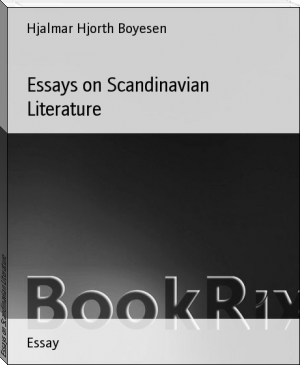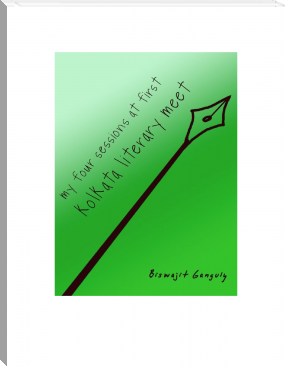Essays on Scandinavian Literature, Hjalmar Hjorth Boyesen [best ebook reader ubuntu txt] 📗

- Author: Hjalmar Hjorth Boyesen
Book online «Essays on Scandinavian Literature, Hjalmar Hjorth Boyesen [best ebook reader ubuntu txt] 📗». Author Hjalmar Hjorth Boyesen
appears to me constantly a matter of less and less consequence."
There is to me a heartrending pathos in these confessions. It is easy to stand aloof, of course, like a schoolmaster with his chastising rod, and lash the frailties of poor human nature. It is easy to declare with virtuous indignation that the man who covets his neighbor's wife is a transgressor who has no claim upon our sympathy. And yet who can help pitying this great, noble poet, who fought so bravely against his "barbaric, Titanic self with its hairy arms"? His passionate intensity of soul was, indeed, part of his poetic equipment; and he would not have been the poet he was if he had been cool, callous, and self-restrained. The slag in him was so intimately moulded with the precious metal that their separation would have been the extinction of the individuality itself. The fiery furnace of affliction through which he passed warped and scorched and cracked this mighty compound, but without destroying it. A glimpse of this experience which transformed the powerful, joyous, bright-visaged singer into a bitter, darkly brooding pessimist, fleeing from the sinister shadow which threatened to overtake him, is afforded us in the poem "Hypochondria[40]":
"I stood upon the altitude of life,
Where mingled waters part and downward go
With rush and foam in opposite directions.
Lo, it was bright up there, and fair to stand.
I saw the sun, I saw his satellite,
Which, since he quenched his light, shone in the blue;
I saw that earth was fair and green and glorious,
I saw that God was good, that man was honest.
"Then rose a dread black imp, and suddenly
The black one bit himself into my heart;
And lo, at once the earth lay void and barren,
And sun and stars were straightway drenched in gloom.
The landscape, glad erewhile, lay dark, autumnal;
Each grove was sere, each flower stem was broken;
Within the frozen sense my strength lay dead,
All joy, all courage withered within me.
"What is to me reality--its dumb,
Dead bulk, inert, oppressive, grim, and crude?
How hope has paled, alas, with roseate hue!
And memory, the heavenly blue, grown hoary!
And even poesy! Its acrobatic
Exertions, leaps--they pall upon my sense;
Its bright mirage can satisfy no soul--
Light skimmings from the surface fair of things.
"Still I will praise thee, oh, thou human race.
God's likeness art thou, oh, how true, how striking!
Two lies thou hast natheless, in sooth, to show;
The name of one is man, the other's woman!
Of faith and honor there's an ancient ditty,
'Tis sung the best, when men each other cheat.
Thou child of heaven, the one thing true thou hast
Is Cain's foul mark upon thy forehead branded.
"A mark quite legible, writ by God's finger;
Why did I fail ere now to heed that sign?
A smell of death pervades all human life,
And poisons spring's sweet breath and summer's splendor.
Out of the grave that odor is exhaling.
The grave is sealed and marble guards its freight,
But still corruption is the breath of life,
Eludes its guard and scatters everywhere.
"Oh, watchman, tell me now the night's dark hour!
Will it then never wane unto its end?
The half-devoured moon is gliding, gliding,
The tearful stars forever onward go,
My pulse beats fast as in the time of youth,
But ne'er beats out the hours of torment sore.
How long, how endless is each pulse-beat's pain!
Oh, my consuméd, oh, my bleeding heart.
"My heart! Nay in my bosom is no heart,
There's but an urn that holds life's burnt-out ashes;
Have pity on me, thou green mother Earth,
And hide that urn full soon in thy cool breast.
In air it crumbles, moulders; earth's deep woe
Has in the earth, I ween, at last an end;
And Time's poor foundling, here in school constrained,
Finds then, perchance, beyond the sun--a father."
[40] The poem is written in the _ottava rime_, but in order to preserve the sense intact I have rendered it in blank verse.
A physical disease which seems to have baffled the skill of physicians may have been the primary cause of the sufferings here described, and was no doubt aggravated by the psychical condition to which I have alluded. Now it was supposed to be the liver which was affected; then again Tegnér was treated for gall-stones. In the summer of 1833 he made a journey through Germany and spent some months at Carlsbad; but he returned without sensible relief. His foreign sojourn was, however, of some benefit in widening his mental horizon. Tegnér's intellectual affinities had always been French; and toward Germany he had assumed a more or less unsympathetic attitude. A slight acquaintance with the philosopher Schleiermacher and the Germanized Norwegian author Henrik Steffens (who was then a professor at the University of Berlin) did not, indeed, reverse his predilections, but it opened his eyes to excellences in the German people to which he had formerly been blind, and removed prejudices which had obscured his vision. He had everywhere the most distinguished reception, and was honored with an invitation to Sans Souci, where he was the guest of the witty Crown Prince of Prussia, later Frederick William IV. But these agreeable incidents of his journey were a poor compensation for his failure to obtain that which he had gone in search of. Fame, honor, and distinguished friends, without health, are but a Tantalus feast, the sweets of which are seen but never tasted.
"I fear," said Tegnér, in his hopelessness, "that my right side, like that of the Chamber of Deputies, is incurable."
"When this Saul's spirit comes over me I often feel an indescribable bitterness, which endures nothing, spares nothing, in heaven or on earth. It usually finds vent in misanthropic reflections, sarcasms, and ideas which I have no sooner written down than I repent of them."
The activity which he unfolded, even in the midst of intolerable sufferings, was phenomenal. He possessed an energy of will and vigor of temperament which enabled him to rise superior to his physical condition, and lure strong music (though sometimes jarred into discords) from the broken lyre. It was in 1829, after his illness had fastened its hold upon him, that he pronounced the beautiful epilogue in hexameters at the graduating festivities at the University of Lund, and crowned the Dane, Adam Oehlenschläger, as the king of poets:
"Now, before thou beginnest the distribution of laurels
Grant me one for him in whom I shall honor them all.
Lo, the Adam of poets is here, the Northern king among singers;
Heir to the throne in poesy's world; for the throne yet is Goethe's.
Oscar, the king, if he knew it, would give his grace to my action.
Now I speak not for him, still less for myself, but the laurel
Place on thy brow in poesy's name, the bright, the eternal.
* * * * *
Past is disunion's age (in the infinite realm of the spirit
Never it ought to have reigned), and kindred tones o'er the water
Ring, which enrapture us all, and they are especially thine.
Therefore, Svea--I speak in her name--adorns thee with laurel:
Take it from brotherly hand, of the day in festal remembrance."
Restless official activity, parliamentary labors, educational addresses, and metrical discourses on memorable occasions filled the years from 1829 to 1840. He felt the demon of insanity lurking behind him, now close at his heels, now farther away; and it was a desperate race, in which life and death, nay, worse than death, was at stake. His indefatigable exertions afforded him a respite from the thought of his terrible pursuer. We can only regard with respectful compassion the outbreaks of misanthropic spleen which often disfigure his correspondence from this period of deepening twilight, relieved by a brief interval of brightness. It is especially woman who is the object of his bitterest objurgation. The venerable _mutabile et varium_ of Virgil is the theme upon which he perpetually rings the changes. No occasion is too inappropriate for a joke at the fickle and faithless sex; and even the school-boys in the Wexiö gymnasium are treated to some ironical advice, _à propos_ of the beautiful jade, which must have sounded surprising in an episcopal oration. Life with its bright pageant was oppressive, like a nightmare to the afflicted poet. All charm, all rationality had departed from existence, which was but a meaningless dance of hideous marionettes. The world was battered and befouled; inexpressibly loathsome. And finally, in 1840, while Tegnér was attending the Riksdag (of which in his official capacity he was a member), the long-dreaded catastrophe occurred. His insanity manifested itself in tremendous projects of reform, world-conquests, and outbreaks of wild sensuality. He was sent to a celebrated asylum in Sleswick; and on the way thither wrote a series of "Fantasies of Travel" which have all the rich harmony of his earlier verse, and are full of delightful imagery. He fancied that there was a huge wheel of fire revolving with furious haste in his head, and his sufferings were terrific. The following fragment from the notes of his attendant, who kept a record of his ravings, has a cosmic magnificence:
"The whole trouble comes from that accursed nonsense about the
diadem which they wanted to put on me. You may believe, though,
that it was a splendid piece. Pictures in miniature, not painted,
but living, really existing miniatures of fourteen of the noblest
poets were made into a wreath. It was Homer and Pindar, Tasso and
Virgil, Schiller, Petrarch, Ariosto, Goethe, Sophocles, Leopold,
Milton, and several more. Between each one of them burned a radiant
star, not of tinsel, but of real cosmic material. In the middle of
my forehead there was the figure of a lyre on the diadem, which had
borrowed something of the sun's own living light; it poured with
such bright refulgence upon the wreath of stars that I seemed to be
gazing straight through the world. As long as the lyre stood still,
everything was well with me--but all of a sudden it began to move
in a circle. Faster and ever faster it moved, until every nerve in
my body was shaken. At last it began to rotate in rings with such
speed that it was transformed into a sun. Then my whole being was
broken, and it moved and trembled; for you must know that the
diadem was no longer put on the outside of my head, but inside, on
my very





Comments (0)